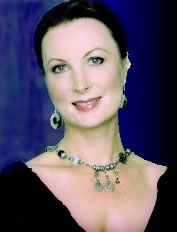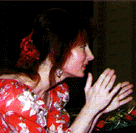 |
![]()

FANFARE-USA Nov.Dec 2000
SELECTIONS-2000 - THE WANT LIST 2000
New readers should be advised that this annual feature of our magazine
was never intended to be an awards ceremony. Each of our reviewers is
simply asked to name five releases from the previous year that were of
particular interest to him or her. If the five "best" recordings of the
year emerge from these pages, so much the better. In the meantime, we
trust that you will find among our listings something that will
intrigue and enlighten you. Happy hunting! G.C. ...........
 MÛZA RUBACKYTE for her F.
Liszt, Parcours satanique (LYR 183) recording.
MÛZA RUBACKYTE for her F.
Liszt, Parcours satanique (LYR 183) recording.
On a Sunday afternoon in May of last year, another of the world's great
pianists slipped quietly in and out of town for a recital at Portland
State University without that city's proud musical establishment being
the wiser, leaving behind a packed auditorium of astonished auditors
and a small contingent of gratified admirers, some of whom had traveled
vast distances to take in one of Mûza Rubackyté's rare
American appearances. (Say "Roo-baht-skee-tay"' the final syllable
lightly accented.) She is a slender, pale Lithuanian beauty aureoled in
a cloud of fiery auburn hair (like one of Dante Gabriel Rossetti's
Pre-Raphaelite sirens); how is it that she is not better known? The
usual explanation is that, after she created a sensation at the 1981
Budapest Liszt-Bartok International Piano Competition, and walked away
with the Grand Prize, her involvement in the Lithuanian resistance
movement cost her the removal of her passport. She did not appear again
in the West until 1989, after perestroika. As do such eminent
Immigrants as Rostropovich and Feltsman, she has wry reminiscences of
being scheduled by Gosconcert, the controlling state musicians' agency,
for concerts in schoolrooms and at workers' lunch breaks, of endless
tours to Siberia and Mongolia. Hearing her recordings, it's strange to
think of such rare artistry enchanting the lurid air of, say, Tashkent,
Ulan Bator, or Alma Ata Had she been allowed to fulfill the contracts
made in the wake of her 1981 triumph, I do not doubt that she would
have been seen as a younger rival to Argerich, in the way that Callas
and Tebaldi were inevitably paired and compared. But there's also a
certain nonchalance toward the usual career-building maneuvers, or the
cultivation of the American "market," which is au fond a drive for
complete artistic freedom. Her concerts are largely given along the
Paris-Prague axis to a number of devoted connoisseurs. And, while her
repertoire is large and, in some ways, unusual (check her Web site,
www.muza.free.fr), she plays only what suits her, what she has made
uniquely her own. For instance, Liszt. A number of years ago a Liszt
recital CD mysteriously turned up in the mail, fronted by a photograph
of a charismatically beautiful woman wearing an oddly knowing
expression. . . . "She couldn't possibly play the piano competitively
in this program," I thought, tossing it aside; "she's trading on her
looks." At the last moment for deadline, I dutifully slipped this
dynamite disc (Lyrinx LYR I 10) into the changer, to be caught by an
immediate lift and held spellbound, transported ... and stammering, as
you'll see if you look up my review in 17:3. Wondering why the review
copy had been sent from France, I called Lyrinx's domestic distributor
to be told that "that's an early number; we won't be carrying it."' And
they wouldn't; they didn't. Nor, apart from her radiant two-CD account
of the music of her compatriot Mikolajus Ciurlionis for Marco Polo (see
18: 1), are her recordings available here as I write-but Seaford Music
in East Sussex can get them for you (and I urge you to allow them-check
the Fanfare classifieds). Given this slipshod, haphazard, fatuous, and
stultifying Baneful Midas touch of "the business," you wonder why
Mûza Rubackyté is not a household word.... But the music,
the artistry! A subsequent recording of the Paganini Etudes (Lyrinx LYR
156, 21:5) confirmed the magic. In the best of the numberless Liszt
recitals one is deluged by every year (all those eager, avid
youngsters-and not so youngsters-hot to re-create The Legend), there is
an agonistic or gladiatorial aspect generating a kind of dry heat as
hard-won Big Technique meets the impossible nec le plus ultra language
Liszt fashioned for his richest thoughts. Such moments are impressive,
estimable, promising. You will not hear them in Rubackyté's
performances, for they inhabit an altogether different dimension, a
dimension that no longer promises but delivers, a dimension, indeed,
for which such terms as "phenomenal" or "legendary" should be reserved.
Her Liszt sounds strangely easy and simple as the glittering scales and
arpeggios, the taxing trills and tremolandi, recede into a glowing
background before the most seductive bel canto as this muselike
inspiratrice-a veritable tigress on the keys, if you will--caresses the
keyboard. Despite an absolute clarity of articulation, the sound mass
dissolves in a wash of color and poetry, calling before us "the Liszt
of Italy, the Italy of Paganini and Byron, with all the life's
experiences of Liszt in his old age in Rome" (to borrow, once more,
from Dr. Dent's description of Busoni). On first acquaintance I
thought, "Well-yes!-this is awesome, but she has added some detail or
improvising a rather free transcription of her own," only to be struck
by her complete fidelity to every indication and nuance as I followed
in score. Lisztian hieroglyphics had suddenly become a living language!
Which is to say that every album by Rubackyté is, indeed, an
event. In her latest offering (listed below), the Dante Sonata and the
B-Minor Sonata may seem understated until one grasps that the octave
salvos, the throbbing grandioso chords, the amorous cantando espressivo
aren't clattering out of place like loose dentures but worked into an
overarching expressive design. Unlike that legion of anxious
prizewinners marching upon us every season, she's at the peak of her
career with nothing to prove and everything to say. The enormous
popularity, in its day (which ran to the century's end), of Meyerbeer's
Robert le diable, and Liszt's transcription of its Valse infernale,
have puzzled me for a lifetime. Earl Wild's superbly sizzling account
of the latter (in his Demonic Liszt offering [Vanguard OVC 4035]-a
revealing complement to the present program) cast it as virtuoso camp.
But compare his monochrome to the veritable peacock's tail
Rubackyté draws from itthe insipid Meyerbeer tunes seem
inspired! In this company, Leslie Howard's flat, literal rendering does
not even rate honorable mention. And where Wild leaves the poor devil
of the Mephisto Polka in a sulphurous blaze, Rubackyté finds him
a creature of air, sardonic but enticing. Which is to say that her
richly interpreted performances are to live with. By the way, this
country has its connoisseurs, too, and Mûza is scheduled for
concert appearances in Nashville on January 5 and 6, somewhere in North
Carolina on March 16 and 17, and Canton, Ohio, on March 25 (details, as
they firm up, from Keyboard Artists International, at keyboardint@att.
net). Hear her.
BUSONI Die Brautwahl - Barenboim/Berlin
Staatsoper -- TELDEC 3984-25250-2 (2 CDs) BUSONI Doktor Faust - Naga
no/H enschel/Begley/Opéra de Lyon -- ERATO 3984-25501-2 (3 CDs)
GODOWSKY Studies on Chopin's Ittudes -- Hamelin - HYPERION CDA 67411/2
(2 CDs) GODOWSKY Java Suite - Budiardjo - PROPIANO PPR224529- LISZT
Parcours satanique - Rubackyté - LYRINX LYR 183